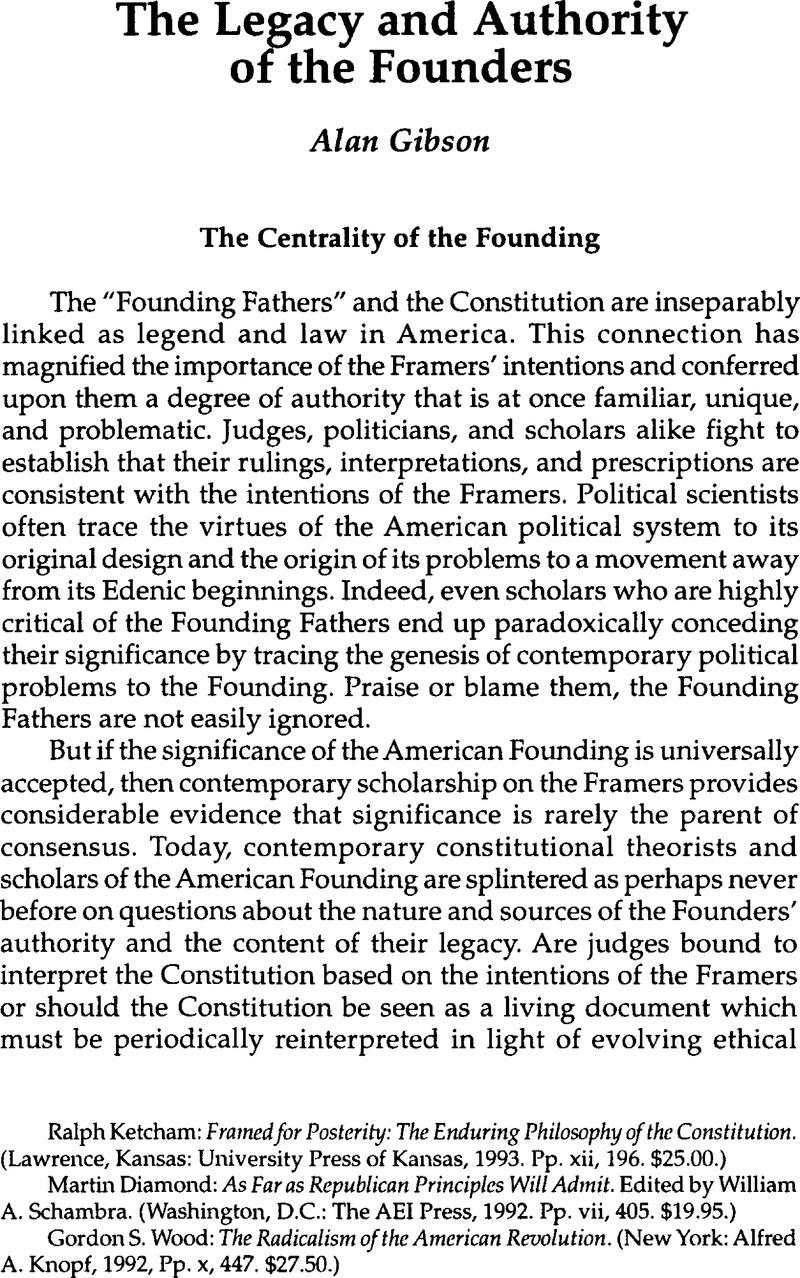No CrossRef data available.
Article contents
The Legacy and Authority of the Founders
Published online by Cambridge University Press: 05 August 2009
Abstract

- Type
- Review Essay
- Information
- The Review of Politics , Volume 56 , Issue 3: Special Issue on Public Law , Summer 1994 , pp. 555 - 577
- Copyright
- Copyright © University of Notre Dame 1994
References
1. Dworkin, Ronald, Taking Rights Seriously (Cambridge, MA: Harvard University Press, 1977), pp. 131–49.Google Scholar
2. Wood, Gordon S., “Rhetoric and Reality in the American Revolution,” William and Mary Quarterly 23 (10 1966): pp. 3–32.CrossRefGoogle Scholar
3. See especially Wood, Gordon S., “Intellectual History and the Social Sciences” in New Directions in Intellectual History, ed. Conkin, Paul and Higham, John (Baltimore: Johns Hopkins University Press,, 1979), pp. 27–41Google Scholar; and Wood, , “Ideology and the Origins of Liberal America,” William and Mary Quarterly 44 (07 1987): 628–34.CrossRefGoogle Scholar
4. Wood, Gordon S., The Creation of the American Republic, 1776–1787 (Chap Hill, NC: University of North Carolina Press, 1969), pp. 471–564, 593–615.Google Scholar
5. See especially Wood, , “Interests and Disinterestedness in the Making of the American Constitution,” in Beyond Confederation: Origins of the Constitution and American National Identity, ed. Beeman, Richard, Botein, Stephen, and Carter, Edward C. II (Chapel Hill, NC: University of North Carolina Press, 1987), pp. 69–109.Google Scholar
6. For a discussion and listing of the scholarship which challenges the pluralist reading of the tenth Federalist Paper, see Gibson, Alan, “Impartial Representation and the Extended Republic: Towards a Comprehensive and Balanced Reading of the Tenth Federalist Paper,” History of Political Thought 12 (1991): 265–67 and notes 8, 10, and 11.Google Scholar The nationalistic interpretation of Madison's conception of federalism has recently been challenged by Michael Zuckert. See Zuckert, , “Federalism and the Founding,” Review of Politics 48 (1986): 166–210.CrossRefGoogle Scholar Lance Banning's forthcoming study of the political thought of James Madison promises to weaken further this interpretation. For now, see Banning, , “The Hamiltonian Madison: A Reconsideration,” Virginia Magazine of History and Biography 62 01 1984): 3–28.Google Scholar
7. Rahe, Paul, Republics: Ancient and Modern: Classical Republicanism and the American Revolution (Chapel Hill, NC: University of North Carolina Press, 1992).Google Scholar




